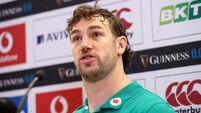Jerry Flannery keeping the Munster value system intact through years of change

AMIDST the turmoil of the last four seasons at Munster, Jerry Flannery has been one of the few constants as head coaches have come and gone.
Since the departure of Rob Penney in the summer of 2014, after which former hooker Flannery was appointed Anthony Foley’s scrum coach, the turnover at the top of the team management tree has not pointed to a great deal of stability in the province.















